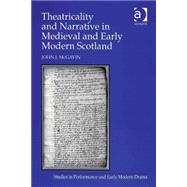Theatricality and Narrative in Medieval and Early Modern Scotland : Studies in Early Scottish Records of Play and Dissent
, by McGavin, John J.- ISBN: 9780754607946 | 0754607941
- Cover: Hardcover
- Copyright: 7/30/2007
John McGavin here analyses narrative accounts of public theatricality in late medieval and early modern Scottish culture (pre-1645). He shows that journals, memoirs and chronicles record events which were often ambiguous in genre, confrontational in action and aimed at both present and future 'spectators'. McGavin demonstrates that early Scottish culture is revealed as much in its processes of witnessing as in that which it claims to witness. Theatricality and Narrative in Medieval and Early Modern Scotland analyses narrative accounts of public theatricality in late medieval and early-modern Scottish culture (pre-1645). Literary texts such as journal, memoir and chronicles reveal a complex spectatorship in which eye witness, textual witness and the imagination interconnect. The narrators represent a broad variety of public actions as theatrical: included are instances of assault and assassination, petition, clerical interrogation, dissent, preaching, play and display, the performance of identity and the spectatorship of tourism. Varying influences of personal experience, oral tradition, and existing written record colour the narratives. Discernible also are those rhetorical and generic forms which witnesses employ to give a comprehensible shape to events. Narratives of theatricality prove central for understanding early Scottish culture since they record moments of contact between those in power and those without it; they show how participants aimed to influence both present spectators and the witness of history; they reveal the contested nature of ambiguous public genres, and they point up the pleasures and responsibilities of spectatorship. McGavin demonstrates that early Scottish culture is revealed as much in its processes of witnessing as in that which it claims to witness. Although the book's emphasis is on the early modern period, its study of chronicle narratives takes it back from the period of their composition (predominantly 15th and 16th century) to earlier medieval events. Contents: Introduction: A witness fit for purpose; The public scene; Enacting revenge; Theatre of departure; From David Lindsay to Skipper Lindsay; The Barren show; Afterword; Bibliography; Index. About the Author: John J. McGavin teaches in the School of Humanities at the University of Southampton, UK.







